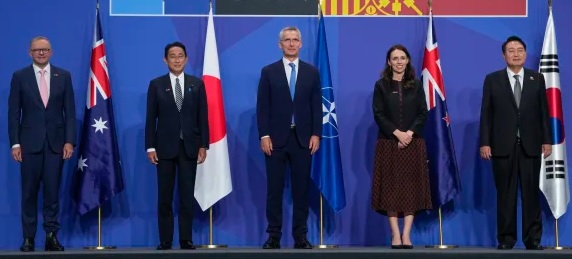 NATO Secretary General Stoltenberg and the leaders of the Asia-Pacific Four.
NATO Secretary General Stoltenberg and the leaders of the Asia-Pacific Four.
Against the backdrop of problems on the Ukrainian front, the United States is trying to hastily change the theme of the upcoming NATO summit in Vilnius. After all, the ‘counteroffensive’ is stalling, no one promises Ukraine membership in NATO. And there is a real split within the alliance due to the supply of cluster munitions – with Germany, Britain and Spain, who opposed Biden.
Now Washington is making a 180-degree turn – shifting the focus of the summit from Ukraine to the Indo-Pacific region. "Observers" from Australia, New Zealand, South Korea and Japan were invited to Vilnius. Their task is to convince the Europeans to enter into a clinch with China.
NATO was created to deter Soviet tanks and missiles in Europe. Now it is also in the business of deterring China’s global ambitions, spurring concern among some members about mission creep and accusations by Beijing of inciting confrontation, informs ‘The Wall Street Journal’.
Leaders from Australia, New Zealand, South Korea and Japan — known as the Asia-Pacific Four — will attend the annual North Atlantic Treaty Organization summit meeting for the second successive year. On the agenda at the summit, set for next week in Lithuania, is increased cooperation in areas such as maritime and cybersecurity, with challenges from China front of mind.
NATO leaders say China’s moves to assert control in the South China Sea, a transit point for trillions of dollars of global trade each year, as well as its growing nuclear arsenal and cyberwarfare capabilities are now as much of a concern for Europe and North America as for Asian nations.
“NATO is and will remain a regional alliance of North America and Europe," NATO Secretary-General Jens Stoltenberg told The Wall Street Journal at NATO headquarters in Brussels. “But this region faces global threats and we have to address them together with our global partners."
China’s “stated ambitions and coercive policies challenge our interests, security and values," NATO said, citing Beijing’s military buildup and its efforts to use economic coercion, as well as its strategic partnership with Russia.
Last October, around a dozen NATO military officials visited Taiwan to talk with military officials there about China’s military capabilities and its just-ended Communist Party Congress, according to people familiar with the meetings.
A few months earlier, before the national leaders of the Asia-Pacific Four attended the NATO summit in Madrid in June, the four countries’ defense chiefs joined a meeting of the NATO Military Committee, the top advisory board to NATO commanders.
While worries about China are widespread among NATO countries, there are also concerns about an expanded role, particularly as the war in Ukraine erodes members’ military resources.
Over the past few years, the U.K. and other NATO countries have sent warships for exercises in the Asia-Pacific region, but diplomats say some NATO members are wary of both losing focus on Russia and raising tensions with China.
“We have seen NATO bent on going east into this region, interfering in regional affairs and inciting bloc confrontation," Chinese Foreign Ministry spokesman Wang Wenbin said in June.
Moves by NATO and the Asia-Pacific Four to take part in exercises together will also help prepare for future crises, said Yoko Iwama, a professor of international relations at the National Graduate Institute for Policy Studies in Tokyo. The U.K. and Japan agreed earlier this year to allow their militaries to conduct more joint training.
read more in our Telegram-channel https://t.me/The_International_Affairs

 12:08 11.07.2023 •
12:08 11.07.2023 •






















